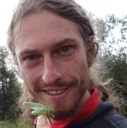Ph. D.

Julian Frey
A1: Remote sensing based methods for the assessment of forest structures
Julian achieved his B.Sc. in Environmental Sciences from Lüneburg University before continuing his education at the University of Freiburg. In Freiburg he obtained his M.Sc. with a concentrations in environmental modeling, statistics, remote sensing and GIS. He is excited to work with ConFoBi project because he believes it’s a great chance to work in a relevant field with an interdisciplinary, and interesting, team.
Julian’s Ph.D. thesis topic focuses on remote sensing based methods for the assessment of forest structures, which are meaningful for biodiversity. He assesses research areas at three different scales; small structures will be recorded and analyzed with a terrestrial laser scanner, while the whole plot is recorded with a Camera-UAV. For the surrounding landscapes he uses high resolution areal images to identify landscape structures. He will analyze the resulting sets with innovative data processing, modeling, and statistic techniques.

Thomas Asbeck
A2: Retention of structural elements in selectively used forests
Thomas completed his B.Sc. of Forest and Nature Conservation at Wageningen University in the Netherlands, between 2009 and 2012. He then became an Erasmus Mundus Master of European Forestry at the University of Eastern Finland, Joensuu, and at the Swedish University of Agricultural Sciences, Alnarp. The topic of his Ph.D. is the retention of structural elements in selectively used forests with a special focus to tree micro-habitats. Through his previous education, Thomas has a wide understanding of various forest biodiversity conservation practices, especially in different regions of Central Europe and Scandinavia. Because of this, he recognizes the importance of ConFoBi’s transdisciplinary approach and the necessity to combine knowledge from different perspectives. Thomas assesses and records tree micro-habitat structures which he then analyses using spatial and statistical tools. After ConFoBi, he looks forward to new challenges in, or outside of, scientific research.

Diane Stevenson
B1: Epiphyte and microhabitat diversity and function on habitat trees
Diane studied at the Reading University where she received her M.Sc. in Plant Diversity, Taxonomy and Systematics. Her thesis was Molecular Systematics of Aspalathus L. (Fabaceae). Currently, her Ph.D. thesis focuses on epiphyte and micro-habitat diversity and function on habitat trees. She decided to participate in the ConFoBi project because of her interest in epiphytes and forestry, officially bringing her back in into academia. Diane’s goals after the project are to continue in her academic research or to work in forest conservation.

Jan Helbach
B1: Epiphyte and microhabitat diversity and function on habitat trees
Jan started his undergraduate studies in chemical engineering. His interests evolved and led him to pursue an M.Sc. in Geo-ecology, with a focus in botany, zoology and ecology, from Eberhard Karls University, Tübingen. During his academic career, Jan completed an internship at NABU Natural Reserve Centre Wollmatinger–Reed, where his responsibilities included surveying threatened species, monitoring and controlling invasive species, and promoting landscape conservation.
As a Ph.D.-candidate of ConFoBi, Jan aims to study plant diversity of managed forest ecosystems. His contribution to his subproject is to investigate the conditions which lead retention forestry to have higher plant diversity and how retention forestry can be an instrument for conserving diversity in temperate forests. Jan’s research will include a closer look on how habitat trees and standing dead wood influence their environment and if they increase heterogeneity in their surroundings.
For Jan, ConFoBi provides the opportunity to conduct research in the field of biodiversity within a group of related researchers and transdisiplanary researchers. He also believes that forests are near natural ecosystems in central Europe that should be protected. They still cover large areas and assume a wide range of ecosystem services, i.e. habitats for a variety of species, filtering the air, storing carbon dioxide and many other benefits. Jan is interested in factors harming rare and sensitive ecosystems such as invasive species or climate change. In these cases he looks to the plant community scale in order to detect changes, spatially and temporally.

Anna Knuff
B3: Diversity and functions of plant-insect interactions along a forest retention gradient
anna.knuff@nature.uni-freiburg.de
www.nature.uni-freiburg.deAnna studied Biology (B.Sc.) at the University of Erlangen and Biodiversity and Ecology (M.Sc.) at the University of Bayreuth. During her studies she became fascinated by the complex relationships between species, especially between plants and insects. This interest led her to choose a master thesis on infestation patterns of domestic and wild apple species by a florivorous beetle (doi: 10.1111/jen.12341). Motivated by this first success, Anna set out to look for a Ph.D. position. The ConFoBi project soon engaged her interest as it investigates, not only the factors on which forest biodiversity depends, but also the question of how these newly gained insights could be implemented in forest management.
In her subproject, Anna evaluates how the diversity of Hymenopteran species relates to the quality, heterogeneity and spatial distribution of habitat trees and coarse woody debris within the forest, at a plot scale and at the landscape scale. Research in agricultural landscapes has shown that the effectiveness of management practices to protect biodiversity depends on the surrounding landscape; Anna’s research will test whether this is also true for the forest ecosystems in the ConFoBi study plots.
Anna works with bird-plant interactions – birds play an important role in seed dispersal, along with her study of insect-plant relationships – herbivory by insects impacts plant fitness. These relationships are shaped by elements of habitat ecosystems and surrounding landscapes, such as forest structure, i.e. dead wood, herbivory by gall-inducing insects, and fruit predation by frugivorous birds can play important. Anna’s research will add to the knowledge of how landscape complexity and habitat elements contribute to insect diversity and how they structure important interactions of birds, insects, and plants.

Nathalie Winiger
B4: Functional connectivity among saprophytic beetles in dead wood patches
Nathalie graduated from the University of Bern with a B.Sc. in Biology with a special focus in ecology and evolution. She went on to complete her M.Sc. in Animal Ecology and Conservation, graduating in 2014.
She has a strong interest in applied ecology. The possibility of “real world” implementation was a priority when developing her master thesis. The thesis investigates the lack of recolonization in restored habitats for the endangered European Nightjar in Switzerland. Habitat characteristics and moth abundance, as their primary prey, were explored to provide habitat management recommendations.
During a research project at the Natural History Museum in Florida, in the McGuire Center for Lepidoptera and Biodiversity, Nathalie studied the evolution of hind-wing tails of Arsenurinae, a subfamily of Lepidoptera. She found molecular methods used to resolve the phylogeny was extremely interesting, ultimately leading her to a Ph.D. thesis combining conservation biology with molecular tools. This combination of conservation, ecology, entomology and molecular tools are the main focus of her Ph.D. thesis. She is investigating the influence of retention forestry, forest structure and amount of dead wood on saproxylic beetle assemblages and genetic diversity. Furthermore she will analyze the functional connectivity of a saproxylic beetle and the importance of landscape composition.

Marlotte Jonker
B5: Landscape-moderated use of forest structures by bats
Marlotte studied Forest and Nature Conservation at Wageningen University in the Netherlands where she specialized in ecology. Her focus in ConFoBi is the landscape-moderated use of forest structures by bats. She was thrilled and surprised to be accepted to the project because she had been out of academic research for five years. During this time she gained a lot of experience in ecological consulting which continued to fuel her interest in ecology and helped her become part of the ConFoBi project. She describes her opinion of ConFoBi as “such a great project: complex, international, multilevel and off course the topic: forests AND bats. Everything I had been looking for!”.
Marlotte records the ultrasonic sounds of bats at each research plot. After she analyzes the data she hopes to have a deeper understanding about bat species richness and diversity. Ultimately she would like to relate her findings to habitat structures in the forest and to the landscape context. The big picture question she has set out to solve is if ‘retention forest measurements’, such as leaving dead wood and habitat trees within the forest, will effectively contribute to the conservation of bat biodiversity.
Marlotte sees a future for herself in science; she would like to “contribute to our understanding of nature: to discover things we didn’t know and provide tools that could help to conserve nature. Next to that, I want to bring a smile to the world, keep creating and I hope to ‘stay hungry, stay foolish…’”.

Marco Basile
B6: Multi-scale assessment of bird-forest relationships
Marco studied Natural Science at University of Naples ‘Federico II’ and Environmental Biology at University of Rome ‘La Sapienza’. His thesis was on the relationship between forest structure and the short-toed treecreeper, Certhia brachydactyla, a forest specialist. During his university career he got involved in many research and field activities with birds, amphibians, reptiles and mammals.
Marco now works on the relationship between forest structure and birds in a broader context. This takes into account the influence of landscape composition and local forest management practice. Applying for ConFoBi was the natural progression for Marco’s master’s project. With ConFoBi he will be conducting ornithological field work in his research areas; he will survey forest specialist birds with count data and identifying species that he observes. After ConFoBi Marco plans to continue ornithological research.

Andrey Lessa
C1: Economic valuation of biodiversity-oriented forest management strategies
Andrey holds a B.Sc. in Forest Engineering at the Federal University of Paraná (URPR) in Brazil. He continued his studies at UFPR where he achieved his M.Sc. in Forest Management. Andrey’s academic career then led him to complete an impressive double M.Sc. through the University of Eastern Finland and the University of Freiburg.
Andrey’s interest in multidisciplinary projects, with expected outcomes relevant for practitioners and decision-makers, brought him to apply for a Ph.D. position with ConFoBi. His thesis focuses on the economic evaluation of biodiversity-oriented forest management strategies. He hopes to continue with research in academia and become a faculty member.

Bettina Joa
C2: Local biodiversity knowledge and forest conservation practices
Bettina holds a Dipl.–Ing. (FH) in Environmental Engineering from Weihenstephan-Triesdorf University of Applied Sciences and a M.Sc. in Geography of Global Change from the University of Freiburg. Her master thesis was about Renewable Desalination as an approach to address drinking water scarcity in Kiribati.
When applying for ConFoBi, Bettina was particularly attracted by its transdisciplinary approach as it matches her own interdisciplinary background combining nature with social sciences. Furthermore, she is already very familiar with the Black Forest as a research site and appreciates the opportunity to explore it in more detail.
Her Ph.D. thesis focuses on local biodiversity knowledge and forest conservation practices. Thereby, Bettina is interested in the people working in the forests and earning (part of) their livelihoods with it. She uses social science approaches to investigate the local ecological knowledge of forest practitioners and how it is related to biodiversity conservation.
Ronja holds a B.A. from Freiburg University in Sociology and Anthropology and a M.A. from Potsdam University in Sociology. During her master’s studies she also attended interdisciplinary courses, focusing on questions of gender and environment as well as qualitative research methods. In her more theoretically oriented master thesis, she focused on the role of the body and materiality in sociological theory and relations to new phenomenology and new materialism. This led her to theoretical questioning of the nature/culture dualism.

Ronja Mikoleit
D1: Professional epistemologies and integration of
biodiversity-related knowledge into socio-political decision-making
Ronja holds a B.A. from Freiburg University in Sociology and Anthropology and a M.A. from Potsdam University in Sociology. During her master’s studies she also attended interdisciplinary courses, focusing on questions of gender and environment as well as qualitative research methods. In her more theoretically oriented master thesis, she focused on the role of the body and materiality in sociological theory and relations to new phenomenology and new materialism. This led her to theoretical questioning of the nature/culture dualism.
Ronja’s Ph.D. topic addresses the question of how biodiversity-related knowledge is generated and how it is used in various decision-making contexts. It proceeds from the assumption that biodiversity research, policy, and management are marked by distinct ‘professional epistemologies’ or cultures of knowledge production. Her Ph.D. research strives to analyze the varied institutionalized practices by which members of different professional communities test and deploy knowledge claims, used as a basis for decision-making. In methodological terms, she uses a qualitative-interpretative approach to reconstruct specific ‘knowledge orders’ in the broader ConFoBi research area.
Ronja appreciates ConFoBi for the interdisciplinary exchange with various perspectives, enriching each other’s individual research perspectives and working together in an international team. For her subproject, she plans to utilize a broad range of qualitative research methods such as expert interviews, document analysis and participatory observation of actors in the field of biodiversity research, politics and management. As a sociologist, she believes that environmental topics such as biodiversity are as much about society as they are about nature or the environment. In her opinion, “there needs to be done a lot more social science research on this topic!”.

Fabian Gutzat
D2: Evidence-based biodiversity management of forests
Fabian completed his undergraduate studies in Biobased Products and Bioenergy at the University of Hohenheim. After graduation, he stayed at the University of Hohenheim where he continued his graduate studies in Environmental Sciences. His research interests include evidence-based approaches towards decision-making, assessment of statistical validity and reliability, and socio-ecological systems.With ConFoBi, Fabian is able to continue to explore his research interests. He is exploring the possibilities of evidence-based guidelines in biodiversity-oriented forest management. To this end, the framework routinely used for guideline development in medical sciences will be transferred to environmental sciences.

